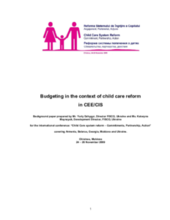Despite the shared commitment of all CEE/CIS country governments to overcome the dominance of residential services for children, alternative family/community-based services have so far failed to become a mainstream possibility for the vulnerable children living in these countries. Most governments recognise that one systemic obstacle to such change is related to the current budgeting approaches which financially benefit – and encourage – large residential providers and create entry barriers to alternative services. This paper attempts to summarise the main issues in public financial management which have prevented resource re-allocation between residential and alternative services for children in these countries, as well as the tools and reform experience which could be used to address these issues throughout the region.

